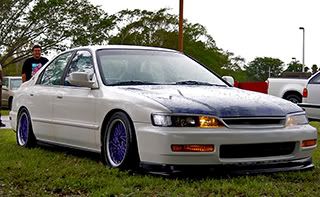just something i spotted on AllData  :
:
Tips for Improving Your Gas Mileage
With today's high gas prices, it's worth taking a few minutes out of your day to make minor modifications that will improve your gas mileage. ALLDATA's ASE certified technicians have developed 22 effective tips for reducing the amount of gas you use while driving your vehicle:
Vehicle Tips
Keep your tires properly inflated, and check them frequently.
Keep your front suspension and steering in proper alignment.
Use the thinnest viscosity oil that your car's manufacturer recommends (5W-30 for most newer cars).
Keep your engine in proper mechanical condition.
Keep your engine in tune and make sure the air and fuel filters are clean.
Make sure your brakes are not dragging.
Repair body damage. That crunched front fender adds aerodynamic drag - just ask any race car driver.
Don't use premium fuel if your car does not require it (check your owner's manual); using it is an unnecessary expense.
Don't waste your money on those late night "as seen on TV" products that are supposed to increase your mileage.
Driving Tips
Avoid excessive warm-up time. Modern engines do not require it.
Don't idle your engine for long periods. Turn off your engine when you leave the car or have to wait a long time.
Avoid jack-rabbit starts.
Keep your speed at 55 miles per hour or less whenever possible.
For newer vehicles with aerodynamic designs, close the windows and turn on the A/C when driving on the freeway.
For older cars with inefficient A/C compressors, use the ventilation system and close the windows, temperature permitting.
Anticipate merging traffic and stoplights - decelerate and accelerate smoothly.
Plan your trips wisely. If you need to go several places, plan a route that allows you to run most or all of your errands in one outing.
Empty the trunk! Extra clothes, overdue library books, tools and the bag of aluminum cans that you have been meaning to take to the recycler all weigh down your car unnecessarily
Car pool whenever possible or practical.
Listen to radio reports for alternate routes around congested areas.
Drive in the highest gear possible (without lugging the engine).
Try to keep your speed constant. Use cruise control when on long stretches of road.
Notes:
According to the U.S. Department of Energy, nearly four million gallons of gasoline could be saved nationwide each day for every one pound per square inch (psi) of tire under-inflation, compared to the mileage if ALL vehicle tires were kept inflated to the manufacturer's recommended pressure.
The U.S. Department of Energy estimates that for 145 million passenger vehicles idling five minutes per day, approximately four million gallons of gasoline are consumed without going anywhere.
According to the U.S. Environmental Protection Agency and Oak Ridge National Laboratory, a vehicle loses about one percent in fuel economy for every one mile per hour above 55 m.p.h. that it is driven. A passenger car that averages 30 miles per gallon at 55 m.p.h. could typically get 28.5 m.p.g. at 60 m.p.h., 27 m.p.g. at 65 m.p.h. and 25.5 m.p.g. at 70 m.p.h. Remember, however, that for different speeds, the changes in fuel economy will vary by vehicle model.
Each 100 pounds of needless weight will cost up to one-half mile per gallon, on the average.
 :
:Tips for Improving Your Gas Mileage
With today's high gas prices, it's worth taking a few minutes out of your day to make minor modifications that will improve your gas mileage. ALLDATA's ASE certified technicians have developed 22 effective tips for reducing the amount of gas you use while driving your vehicle:
Vehicle Tips
Keep your tires properly inflated, and check them frequently.
Keep your front suspension and steering in proper alignment.
Use the thinnest viscosity oil that your car's manufacturer recommends (5W-30 for most newer cars).
Keep your engine in proper mechanical condition.
Keep your engine in tune and make sure the air and fuel filters are clean.
Make sure your brakes are not dragging.
Repair body damage. That crunched front fender adds aerodynamic drag - just ask any race car driver.
Don't use premium fuel if your car does not require it (check your owner's manual); using it is an unnecessary expense.
Don't waste your money on those late night "as seen on TV" products that are supposed to increase your mileage.
Driving Tips
Avoid excessive warm-up time. Modern engines do not require it.
Don't idle your engine for long periods. Turn off your engine when you leave the car or have to wait a long time.
Avoid jack-rabbit starts.
Keep your speed at 55 miles per hour or less whenever possible.
For newer vehicles with aerodynamic designs, close the windows and turn on the A/C when driving on the freeway.
For older cars with inefficient A/C compressors, use the ventilation system and close the windows, temperature permitting.
Anticipate merging traffic and stoplights - decelerate and accelerate smoothly.
Plan your trips wisely. If you need to go several places, plan a route that allows you to run most or all of your errands in one outing.
Empty the trunk! Extra clothes, overdue library books, tools and the bag of aluminum cans that you have been meaning to take to the recycler all weigh down your car unnecessarily
Car pool whenever possible or practical.
Listen to radio reports for alternate routes around congested areas.
Drive in the highest gear possible (without lugging the engine).
Try to keep your speed constant. Use cruise control when on long stretches of road.
Notes:
According to the U.S. Department of Energy, nearly four million gallons of gasoline could be saved nationwide each day for every one pound per square inch (psi) of tire under-inflation, compared to the mileage if ALL vehicle tires were kept inflated to the manufacturer's recommended pressure.
The U.S. Department of Energy estimates that for 145 million passenger vehicles idling five minutes per day, approximately four million gallons of gasoline are consumed without going anywhere.
According to the U.S. Environmental Protection Agency and Oak Ridge National Laboratory, a vehicle loses about one percent in fuel economy for every one mile per hour above 55 m.p.h. that it is driven. A passenger car that averages 30 miles per gallon at 55 m.p.h. could typically get 28.5 m.p.g. at 60 m.p.h., 27 m.p.g. at 65 m.p.h. and 25.5 m.p.g. at 70 m.p.h. Remember, however, that for different speeds, the changes in fuel economy will vary by vehicle model.
Each 100 pounds of needless weight will cost up to one-half mile per gallon, on the average.







Comment